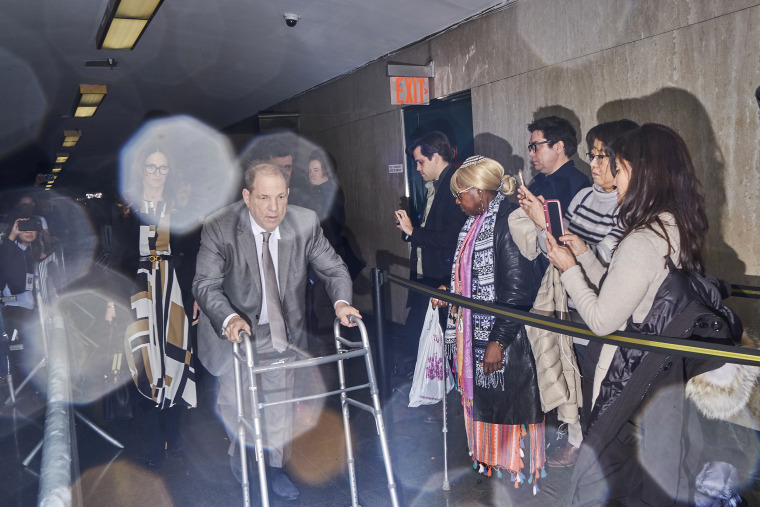“I think he’ll walk,” I told my husband over dinner, the day before the Harvey Weinstein verdict came in. It was not something I had ever said publicly. Feminism depends on believing that progress is possible, and I didn’t want to demoralize other women. Yet I viewed the Weinstein rape trial through the lens of over 10 years of covering rape and rape culture. And what those years had taught me was that, with few exceptions, when a powerful man rapes somebody, he goes free.
What those years had taught me was that, with few exceptions, when a powerful man rapes somebody, he goes free.
Harvey Weinstein will not go free. He has been convicted of one count of third-degree rape, and one count of a criminal sexual act. This is not an undiluted victory. He was convicted of only two assaults, despite being credibly accused by dozens of women, and was acquitted of the two most serious charges. Nonetheless, Weinstein is now a convicted rapist, and he faces another rape trial in Los Angeles. Investigative reporting by The New York Times and New Yorker sparked the #MeToo movement, and now a jury of New Yorkers had brought down one of its most powerful. Something is changing.
You could argue that Weinstein was always likely to be convicted; like Bill Cosby, who was convicted in 2018 of drugging and sexually assaulting Andrea Constand, the list of Weinstein’s accusers was so long that it became impossible for even skeptics to disbelieve them. Many of the women he assaulted or harassed were powerful in their own right, with recognizable names and access to major media platforms. Unlike other rapists who prey on women without wealth or power, Weinstein’s accusers often had recognizable names and substantial public support. He targeted women like Gwyneth Paltrow and Lupita Nyong’o, people the public want to believe.
But I stood in a park in Lower Manhattan at the beginning of this decade protesting a rape case wherein a New York City police officer admitted to raping a woman on tape, and that police officer was not convicted. R. Kelly urinated on a 14-year-old girl on video tape, and he was not convicted, either. Michael Jackson was never convicted of sexually abusing children in his lifetime, despite a trial in 2005 and widely covered allegations dating to 1993. Roman Polanski was convicted of sexually abusing Samantha Geimer at 13 and has never served a single day in prison. Julian Assange successfully dodged a trial for allegedly raping two women in Sweden; Ben Roethlisberger, accused of sexual assault twice in two years, is still a quarterback in the NFL; Donald Trump is still president of the United States. This list could go on for days, and it would not be enough to name every single powerful man who’s faced a high-profile assault case without experiencing any criminal or even social consequences.
Even a few years ago, it felt impossible to convict a powerful man, even in the face of a taped confession or photographic evidence of the attack. As recently as 2015, Manhattan District Attorney Cy Vance refused to prosecute Weinstein despite a taped confession referencing his alleged assault on model Ambra Battilana Gutierrez. Victim-blaming was the expected default in the media — recall that the rape allegations against Assange were dismissed as “surprise sex” or “a broken condom” in major publications — and men like Weinstein were able to manipulate reporters and coordinate smears of their victims without much pushback.
Yet today, Vance stood in front of a crowd and affirmed that “rape is rape… even if there is no physical evidence and it happened a long time ago.” And this fall, when Weinstein began circulating a PowerPoint to friendly reporters instructing them to blame his victims, Irin Carmon of New York broke the story, and Weinstein’s sympathy campaign was publicly dismantled.
It’s a mistake to credit this sea change solely to #MeToo. A cultural shift this profound takes more than two or three years. It happened because of the hundreds of rape survivors who pushed back, constantly and loudly, against rape culture norms. It happened because of independent feminist media, including the feminist blog movement, which substantively pushed and pushed for journalists to change the way we cover and talk about rape and sexual assault.
It happened because of Anita Hill, who forced the concept of workplace sexual harassment into the public consciousness in the early 1990s, and it happened because, decades before that, feminists were fighting for rape and sexual harassment to be recognized as crimes rather than “bad sex” or “flirting.” It happened because of everyone who stood in that park in Lower Manhattan outraged by men’s ability to harm women with impunity. It happened because of every survivor who spoke the truth, whether or not she was ever believed.
Feminism depends on believing that progress is possible. I’ve learned to work for progress even on the days when I don’t believe. But then there are days like this, when I look up, and everything is different, and I remember that believing was always the right thing.


